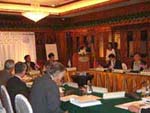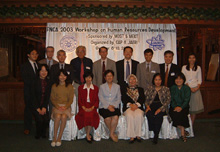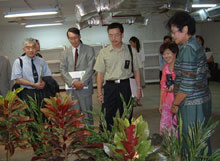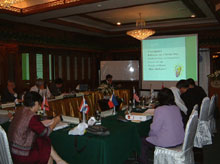MENU

|
| FNCA 2003 Workshop on Human Resources Development |
FNCA 2003 Workshop
on Human Resources Development
|
| |
FNCA 2003 Workshop on Human Resources Development
(HRD) took place on October 8-10, 2003 in Bangkok, Thailand.
This Workshop was sponsored by the Ministry of Science
and Technology (MOST) of Thailand and the Ministry of
Education, Culture, Sports, Science and Technology (MEXT)
of Japan. The Office of Atoms for Peace (OAP) and the
Japan Atomic Energy Research Institute (JAERI) acted
as the hosts.
The number of participants in the Workshop totaled 27
people including 10 observers. The Opening Session and
Presentations of country reports were conducted on the
first day, Round Table Discussions were conducted on
the second day and the Concluding Session was held on
the third day.
The participants of the Workshop were the Project Leaders,
who are the persons responsible for human resources
development-one from each of the seven member countries,
i.e. China, Korea, Malaysia, Thailand, the Philippines,
Vietnam and Japan. (Unfortunately, the Project Leader
from Indonesia could not attend.) Besides the Project
Leaders, four additional participants from Japan attended
the Workshop. The observers were seven from Thailand
and three from Japan.
Themes and contents of the country reports for the Workshop
were as follows, as agreed upon in the last Workshop
and as proposed in the 4th Coordinators Meeting held
in March 2003: |
| |
 |
|
 |
Participants
of the FNCA
2003 Workshop on HRD |
FNCA
2003 Workshop on HRD |
|
| |
 |
Technical
Tour
(Gamma Irradiation Service and Nuclear Technology
Research Center of Kasetsart University) |
|
|
| |
| (1) |
Subject for Development of Nuclear
Training Technology |
| (2) |
Summary of "Survey of Basic Data
on Human Resources Development" |
| (3) |
HRD Strategy |
| (4) |
Others |
|
| |
Program of the 2003 FNCA Workshop
on HRD in the Nuclear field |
| |
| Opening
Session |
| WELCOME ADDRESS |
| OPENING ADDRESS |
| "FNCA
activities and the relationship of HRD project" |
| "Review and Scope of Workshop
on HRD and Procedure for the 2003 Workshop on
HRD" |
|
| |
|
Presentation Session (Country Report) |
|
|
| |
Discussion Session 1
-Information Exchange for Nuclear Training Support- |
| "Education
for Young Generation in the Philippines" |
| "Science
Camp" |
| "Present
Status of ANENT" |
| "Plan
for Nuclear Applications in Thailand (especially
focused on Ongkharak project)" |
|
| |
Discussion Session 2
-Survey of the Basic Data and the HRD Strategy- |
| "Analysis
of the Survey Data on HRD of each country" |
| "University
Education on Nuclear Engineering for Foreign Students,
Researchers and Engineers" |
| "HRD
Strategy for countries with Radiation Applications" |
| "HRD
Strategy for countries planning to construct Nuclear
Power Plants" |
| "Human
Resources Development at the time of constructing
nuclear power stations in Japan" |
|
| |
Discussion Session 3
-Future Plan- |
| Annual Action Plans for 2003
and 3-year Action Plans (2003-2005) |
|
| |
|
Conclusion Session |
| Summary of the Workshop and
Final Discussion on 3-year Action Plans |
| Preparation and Adoption of
the Tentative Minutes |
| Closing Address |
|
|
| |
|
Technical Tour |
| |
|
|
MINUTES
FNCA 2003 Workshop on Human Resources Development
October 8-10, 2003
Bangkok, Thailand
|
| |
| FNCA 2003 Workshop on Human Resources Development (HRD) took place on October 8-10, 2003 in Bangkok, Thailand. This Workshop was sponsored by the Ministry of Science and Technology (MOST) of Thailand and the Ministry of Education, Culture, Sports, Science and Technology (MEXT) of Japan. The Office of Atoms for Peace (OAP) and the Japan Atomic Energy Research Institute (JAERI) acted as the hosts. |
| |
| The number of participants in the Workshop totaled 27 people including 10 observers. The Opening Session and Presentations of country reports were conducted on the first day, Round Table Discussions were conducted on the second day and the Concluding Session was held on the third day. |
| |
| The participants of the Workshop were the Project Leaders, who are the persons responsible for human resources development-one from each of the seven member countries, i.e. China, Korea, Malaysia, Thailand, the Philippines, Vietnam and Japan. (Unfortunately, the Project Leader from Indonesia could not attend.) Besides the Project Leaders, four additional participants from Japan attended the Workshop. The observers were seven from Thailand and three from Japan. |
| |
| Themes and contents of the country reports for the Workshop were as follows, as agreed upon in the last Workshop and as proposed in the 4th Coordinators Meeting held in March 2003: |
| | |
 | Subject for Development of Nuclear Training Technology |
| |
| 1. |
Request and/or proposal for mutual support on the development of training technology and needs regarding materials and curricula |
| | | | | |
 | Summary of "Survey of Basic Data on Human Resources Development" |
| |
| 1. |
Survey of Academic Associations and Societies in the Nuclear Field |
| 2. |
Present Status of the Survey Data (updates of data presented last year) |
| 3. |
Ways of using the Survey Data |
| | | | | |  | HRD Strategy |
| |
| 1. |
HRD strategy based on the survey data and its analysis, and plan for future activities to promote the interest of the young generation in Nuclear Science and Technology |
| | | |  | Others |
| |
| 1. |
Requests and proposals on the MEXT Scientist Exchange Program in Nuclear Energy Research, International Training Course, and University Education (master's degree / doctor's degree) |
| 2. |
Plan for Large Nuclear Projects in the coming 10 years |
| 3. |
Others |
| | | | | At the Round Table Discussions of the Workshop, the main points of the comments for future plans, proposals and opinions agreed upon include the following: |
| | |
 | Subject for Development of Nuclear Training Technology |
| |
| 1. |
Progress of eleven FNCA projects in eights fields were introduced and among them HRD was regarded as indispensable for knowledge preservation and sustainable development. |
| 2. |
Requests and/or proposals for mutual support on the development of training technology, needs on materials and curricula |
| | |
| |
| - | NuTEC/JAERI has provided some of the training materials from the joint training programs with Indonesia, Thailand and Vietnam in the NuTEC website (http://nutec.tokai.jaeri.go.jp/english/e031.htm), as the training materials on radiation protection to be used commonly. | | - | These will be enhanced and more materials will be posted in the website. | | - | Review and comments by Project Leaders on the training materials posted in the website are continuously requested. | | - | Investigation of training materials in CD ROM should be continued for the purpose of introduction and utilization of e-learning system. | | - | Information on the availability of multimedia CD-ROM should be collected. | | | | | |  | Summary of "Survey of Basic Data on Human Resources Development" |
| |
| 1. |
Survey of Academic Associations and Societies in the Nuclear Field
| Survey on the number of principal academic associations and societies and members had been carried out. It had been recognized that these academic associations and societies could play an important role for HRD. | |
| 2. |
Present Status of the Survey Data (updates of data presented last year)
| Data analysis on the Survey for Administrative and National Research and Development Institutes, University Education Institutions, Radiation and Radioisotopes Applications, Nuclear Training courses, Licensees of National Examinations Related to Nuclear Technology, Academic Associations and Societies in the Nuclear Field, which are new for FY2003 and Background Data for Analysis had been presented. It is hoped that the missing data in the graphs will be filled by FY2003. | |
| 3. |
Ways of using the Survey Data
| The Basic Data may be used to compare the special fields among the member countries to realize the differences and similarities of their situations, to clarify the needs of each member country and develop its own HRD strategy based on analysis of the Basic Data. | |
| | | |  | HRD strategy |
| |
| 1. | HRD strategy to be formulated based on the survey data and its analysis, and plans for future activities to promote the interest of the young generation in Nuclear Science and Technology.
| Lively discussion had been carried out and experience in HRD was shared among the member countries. Some of the comments regarding HRD strategy are as follows: |
| - |
The kind of data which is needed and should be gathered in designing the HRD strategy should be considered carefully by each country. |
| - |
Without any step in the actual project, HRD for NPP construction is not possible. HRD can be gained only through actual experience/participation in the project. |
| - |
Implementation of the HRD strategy should be carried out step by step. |
| - |
Implementation of Venture business can be a strategy for HRD. |
| - |
Grants, scholarship programs within the country, cooperation among the member countries, also utilizing JSPS can be a strategy for HRD of the younger generation. |
| - |
New national qualification system for professional engineers in Japan may give an incentive for continuous development of people now working in the nuclear area. |
| | | | |  | Others |
| |
| 1. |
It is desirable that the Scientist Exchange Program of MEXT will be expanded to cover MS. and PhD students. |
| 2. |
Strong interest was shown regarding ANENT, and it was agreed that FNCA HRD should have close linkage with ANENT so that the activities of FNCA HRD will not overlap with the activities of ANENT. |
| 3. |
The Workshop agreed on the Conclusions and Recommendations for the FNCA 2003 Workshop on Human Resources Development shown in the Attachment. The Conclusions and Recommendations will be submitted to the high-level meeting in December 2003 where HRD strategy will be discussed. |
| 4. |
Mid-term plan for HRD project will conclude its activities in 2004. |
| | | |  | Action Items for FY2003 |
| |
| |
| - |
Analysis of database on HRD should be completed early in 2004. |
| - |
The new revised HRD strategy based on the data base analysis should be reported to the HRD workshop in 2004. |
| - |
Prepare a model method for HRD strategy formulation |
| | | | |
| Remarks |
| |
| Malaysia tentatively offered to host the 2004 Workshop on HRD at the 4th FNCA Coordinators Meeting. All participants appreciated the offer and agreed on Malaysia as the venue for the Workshop in 2004. |
| |
| The Workshop included a technical tour to the Office of Atoms for Peace and Kasetsart University. The participants expressed their sincere gratitude to the organizers and host institutions. |
| |
| The Minutes were discussed and agreed upon by all participants in the Workshop. This will be reported at the 5th FNCA Coordinators Meeting to be held in March 2004 in Tokyo, Japan. |
| | | | (Attachment) |
Conclusions and Recommendations
for the FNCA 2003
Workshop on Human Resources Development | | | October 8-10, 2003
Bangkok, Thailand |
| |
| 1. |
HRD is recognized to be an important component for the sustainable development of nuclear science and technology applications. |
| 2. |
The concern was expressed by majority of the meeting participants that the preservation of nuclear knowledge and experience is at risk because of declining number of experts due to retirement and lack of incoming young nuclear scientists and engineers. |
| 3. |
The Meeting recognized that China and Vietnam need a large increase in the number of nuclear engineers, operators, and researchers for future development of nuclear power plants, necessitating the support of FNCA countries. |
| 4. |
Results of the survey on current human resources in each country will be completed in 2004. The results should be utilized for the HRD strategy of each country. The meeting recognized the importance of nuclear related associations and societies for HRD. |
| 5. |
The HRD strategy should be authorized and supported by the high level management responding to the national nuclear program. |
| 6. |
The FNCA members should keep close linkage with Asian Network for Higher Education in Nuclear Technology (ANENT) through active participation and complimentary contribution to it. |
| 7. |
Training materials including e-learning materials should be efficiently produced by sharing works among FNCA countries. Setting up the task force for planning and working for preparation of training materials on work sharing basis is desirable. |
| 8. |
It is desirable that the Scientist Exchange Program of MEXT is expanded to cover M.S. and PhD students. |
| 9. |
It is proposed to prepare a model method for HRD strategy formulation under FNCA HRD. |
| 10. |
Analysis of database on HRD should be completed early in 2004. The result of analysis may be reflected in revising HRD strategy in each country depending on national policy. The new revised HRD strategy based on the data base analysis should be reported to the HRD Workshop in 2004. |
| | | | | | |
Tentative Program of
“The 2003 FNCA Workshop on Human Resources
Development(HRD)in the Nuclear Field”
October 8-10, 2003,
Bangkok, Thailand
|
| | | | | |
 | | 8:30-9:00 |
Registration |
| <Opening Session> |
| MC: (OAP Staff) |
| 09:00-09:05 | WELCOME ADDRESS |
| Secretary General, Office of Atoms for Peace (OAP) |
 | | 09:05-09:20 | OPENING ADDRESS |
| - | Shintaro HARA, Unit Chief for International Cooperation, Atomic Energy Division, Research and Development Bureau, Ministry of Education, Culture, Sports, Science and Technology (MEXT) | | - | Permanent Secretary, Ministry of Science and Technology (MOST) | |  | | 09:20-09:30 | Introduction of Participants |
 | | 09:30-10:00 | Chairperson: OAP |
"FNCA activities and the relationship of HRD project"
Sueo MACHI, Japanese FNCA Coordinator
Japan Atomic Industrial Forum, Inc. |  | | 10:00-10:20 | Commemorative Photograph |
 | | 10:20-10:35 | <Coffee Break> |
 | | 10:35-10:55 | VU Dang Ninh |
"Review and Scope of Workshop on HRD and Procedure for the 2003 Workshop on HRD"
Yasushi SEKI, Japanese Project Leader (PL)
Japan Atomic Energy Research Institute (JAERI) | | | Presentation Session-Country Report |
| Presentations: 20 min. plus 15 min. Q&A for each country |
| | |
| < Presentation Session-2> |
| CHEN Gang |
| 14:10-14:45 |
Vietnam |
VU Dang Ninh |
 | | 14:45-15:20 | Indonesia | Guritno LOKOLLO |
 | | 15:20-15:35 | Coffee break | |
| < Presentation Session-3> |
| Guritno LOKOLLO |
| 15:35-16:10 |
Korea |
Eui-Jin LEE |
 | | 16:10-16:45 | China | CHEN Gang |
 | | 16:45-17:20 | Japan | Yasushi SEKI |
 | | 18:30-20:30 | Reception hosted by MOST and MEXT |  | | | | | | | |
| < Discussion Session 1 > |
Information Exchange for Nuclear Training Support
Rapieh AMIUNDDIN |
| 8:30-8:50 |
"Education for Young Generation in the Philippines" |
| Corazon BERNIDO |
 | | 8:50:9:10 | "Science Camp" |
| Fumitaka SUGIMOTO, NuTEC, JAERI |
 | | 9:10-9:30 | "Present Status of ANENT" |
| Eui-Jin LEE |
 | | 9:30-10:00 | "Plan for Nuclear Applications in Thailand
(especially focused on Onkarak project)" | | OAP |
 | | 10:00-10:15 | <Coffee Break> |
| | | | | | | | |
| < Conclusion Session > |
Warapon WANITSUKSOMBUT
&Yasushi SEKI |
| 08:30-10:00 |
Summary of the Workshop and Final Discussion on 3-year Action Plans |
 |
| 10:00-10:15 |
Coffee Break |
 |
| 10:15-11:15 |
Preparation and Adoption of the Tentative Minutes |
| | < Closing Session > |
| MC: (OAP Staff) |
| 11:15-11:25 |
Closing Address |
| Warapon WANITSUKSOMBUT |
 |
| 11:25-12:45 |
Lunch |
|
| < Technical Tour> |
| 12:45 |
Leave Hotel |
 | | 13:30 | Arrive at OAP |  | | 13:40-14:10 | Welcome | Training Activities at OAP
See Video "Nuclear Activity in Thailand" |  | | 14:10-14:40 | Visit the Follow-up Training course & Training Facility |  | | 14:40-15:00 | Visit Research Reactor |  | | 15:00-15:10 | Transfer to Irradiation Center, Kasetsart University |  | | 15:10-15:30 | Welcome | Introduction to Dept. of Applied Radiation and Isotopes
Training Activities at the Irradiation Center |  | | 15:30-15:45 | Visit Co-60 Irradiation Facility & Lab. Room at the Irradiation Center |  | | 15:50-16:20 | Visit Facilities of Dept. of Applied Radiation and Isotopes |  | | 16:30 | Depart Kasetsart University |  | | |
List of Participants in FNCA 2003 Workshop
on Human Resources Development
|
|
| China |
| Mr. CHEN Gang (Project Leader) |
Deputy Manager
Management Training Center, Human Resources Department,
China Guangdong Nuclear Power Holding Co., LTD (CGNPC) |
|
| |
| Korea |
| Mr. Eui-Jin LEE (PL) |
Manager
Education Program Development,
Nuclear Training Center,
Korea Atomic Energy Research Institute (KAERI) |
|
| |
| Malaysia |
| Ms. Rapieh AMINUDDIN (PL) |
Director
Division of Human Resource Development and Training,
Malaysian Institute for Nuclear Technology Research (MINT) |
|
| |
| The Philippines |
| Ms. (Dr.) Corazon Casenas BERNIDO (PL) |
Head
Nuclear Training Section,
Nuclear Training & Services Division
Philippine Nuclear Research Institute (PNRI) |
|
| |
| Thailand |
| Ms. Warapon WANITSUKSOMBUT (PL) |
Senior Radiation Physicist
Bureau of Radiation Safety Regulation
Office of Atoms for Peace (OAP)
Ministry of Science and Technology |
|
| |
| Vietnam |
| Mr. VU Dang Ninh (PL) |
[VIETNAM] Director
Department of Administration and Personnel Development
Vietnam Atomic Energy Commission (VAEC) |
|
| |
| Japan |
| Mr. (Dr.) Yasushi SEKI (PL) |
Scientific Consultant
Nuclear Technology and Education Center (NuTEC)
Japan Atomic Energy Research Institute (JAERI) |
| Mr. (Dr.) Sueo MACHI |
Senior Managing Director
Japan Atomic Industrial Forum, Inc. |
| Mr. (Prof.) Masanori ARITOMI |
Professor
Research Laboratory for Nuclear Reactors, Tokyo Institute of Technology |
| Mr. Yukoh NAKAYAMA |
Group Manager
Quality Promoting Group, Corporate Planning Department,
The Japan Atomic Power Company |
| Mr. Shintaro HARA |
Unit Chief for International Cooperation,
Atomic Energy Division, Research and Development Bureau,
Ministry of Education, Culture, Sports, Science and Technology (MEXT) |
|
| |
| Observer |
| Mr. (Dr.) Saksit TRIDECH |
Deputy Permanent Secretary
Ministry of Science and Technology (MOST) |
| Mr. (Dr.) Manoon ARAMRATTANA |
Inspector General
Ministry of Science and Technology (MOST) |
| Mr. Pathom YAMKATE |
Secretary-General
Office of Atoms for Peace (OAP) |
| Mr. Poonsuk PONGPAT |
Director
Bureau of Atomic Energy Administration
Office of Atoms for Peace (OAP) |
| Ms. Jindarom CHVAJARERNPUN |
Head
International Cooperations Group
Bureau of Atomic Energy Administration
Office of Atoms for Peace (OAP) |
| Ms. Kannika KAEWSRISANG |
Foreign Relations Officer
International Cooperations Group
Bureau of Atomic Energy Administration
Office of Atoms for Peace (OAP) |
| Ms. Pannee PAKKONG |
Professor
Department of Applied Radiation and Isotopes
Faculty of Science
Kasetsart University |
| Mr. Masaru HAYASHI |
Technical Consultant
Nuclear Safety Research Association (NSRA) |
| Mr. (Dr.) Takatoshi TAKEMOTO |
Mechanical Engineering
Department of Engineering
Chulalongkorn University
(Originally from Tokyo Institute of Technology) |
| Ms. (Dr.) Yuko IKUTA |
Visiting Professor
Department of Applied Radiation and Isotopes
Faculty of Science
Kasetsart University
(Originally from Japan Atomic Energy Research Institute) |
|
| |
| Secretariat |
| Ms. Sukanya CHANTARAMONGKOL |
Head
Technology Promotion and Transfer Group
Bureau of Atomic Energy Administration
Office of Atoms for Peace (OAP) |
| Ms. Kanchalika DECHATES |
General Admin. Officer
Technology Promotion and Transfer Group
Bureau of Atomic Energy Administration
Office of Atoms for Peace (OAP) |
| Ms. Keiko HANAMITSU |
Deputy Manager
Asia Cooperation Center, Japan Atomic Industrial Forum, Inc. |
| Mr. Takeyoshi KAJIYAMA |
General Manager
Nuclear Technology and Education Center (NuTEC)
Japan Atomic Energy Research Institute (JAERI) |
| Mr. Fumitaka SUGIMOTO |
Chief
International Technology Transfer Division
Nuclear Technology and Education Center (NuTEC)
Japan Atomic Energy Research Institute (JAERI) |
| Ms. Rei OUCHI |
Secretariat
International Technology Transfer Division
Nuclear Technology and Education Center (NuTEC)
Japan Atomic Energy Research Institute (JAERI) |
|
|
|
|